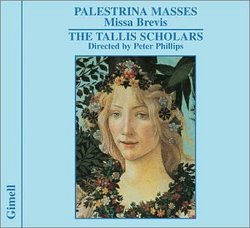| All Artists: Giovanni Pierluigi da Palestrina, Giovan Leonardo Primavera Title: Palestrina Masses: Missa Brevis Members Wishing: 0 Total Copies: 0 Label: Gimell UK Release Date: 7/9/2002 Album Type: Import, Original recording reissued Genres: Pop, Classical Styles: Vocal Pop, Opera & Classical Vocal, Historical Periods, Early Music Number of Discs: 1 SwapaCD Credits: 1 UPC: 755138100824 |
Search - Giovanni Pierluigi da Palestrina, Giovan Leonardo Primavera :: Palestrina Masses: Missa Brevis
 | Giovanni Pierluigi da Palestrina, Giovan Leonardo Primavera Palestrina Masses: Missa Brevis Genres: Pop, Classical
|
Larger Image |
CD Details |
CD ReviewsJoy is born FrKurt Messick | Bloomington, IN USA | 06/10/2004 (5 out of 5 stars) "--Palestrina--
Giovanni Pierluigi de Palestrina is sometimes called the greatest composer of the Roman Catholic church. Born in 1525 near Rome, he spent the better part of his career in service to the church as a choir member, choir master, conductor, composer and school master. He was sought after by many churches, and sometimes his popularity and skill got him into trouble both with his clerical patrons and with fellow musicians. He was offered prestigious positions in Rome and Vienna which were ultimately withdrawn because Palestrina's salary and conditions requirements were too high. He had some influence on the Council of Trent's musical decisions for reform of the Catholic worship practices, and was involved intimately with revising the Gradual and produced a harmonised version of the Latin Hymnal in 1589. He died in 1594.--Palestrina: Missa Brevis-- Despite the implication of the name, Palestrina's Missa Brevis is a very substantial mass, written in four parts. The mystery of the name remains, as there are no plainsong chants or motets that are natural parody sources for this mass, unusual for the time. The music is SATB, increasing over the course to SSATB for the final Agnus Dei.The other mass presented here by Palestrina, Missa Nasce la goija mia, is one that has a secular source in parody. The original piece by Primavera (1540 - 1585) is included here prior to the mass; he wrote popular melodies for madrigals and others. The tune was worthy, and Palestrina's treatment of it shows great care and expansion toward the liturgical needs and choir capabilities. This is a very full piece, scored for SSATTB.All of these pieces are wonderfully performed, and taken as a set, they make a wonderful snapshot of Roman Catholic/high Anglican sensibility from the time of religious upheaval due to the Reformation. They also serve to show a wonderful history of development from the simple to the complex, and the virtues of the music at each stage.--Liner Notes-- Being internationally acclaimed, the Tallis Scholars' CDs typically present their commentary and texts in English, French, German and Italian (also a translation here for the lyric Nasce la gioia mia - My joy is born); that is true of this disc, which unfortunately does not contain the text of the mass. The cover art also typically represents visual arts contemporary with the compositions - here it is a piece by Botticelli, who was a rough historical contemporary of Palestrina (only a few generations separate them). One drawback is that there is little information on the Tallis Scholars or Peter Phillips in the booklet.--The Tallis Scholars-- The Tallis Scholars, a favourite group of mine since the first time I heard them decades ago, are a group dedicated to the performance and preservation of the best of this type of music. A choral group of exceptional ability, I have been privileged to see them many times in public, and at almost every performance, their singing seems almost like a spiritual epiphany for me, one that defies explanation in words. Directed by Peter Phillips, the group consists of a small number of male and female singers who have trained themselves well to their task.Their recordings are of a consistent quality that deserve more than five stars; this particular disc of pieces by Palestrina and Primavera deserves a place of honour in the collection of anyone who loves choral music, liturgical music or Gregorian chant, classical music generally, or religious music. It is astonishing one of the earlier recordings of the Tallis Scholars (originally recorded in 1986) of Palestrina, one of their favourite subjects." |

 Track Listings (11) - Disc #1
Track Listings (11) - Disc #1